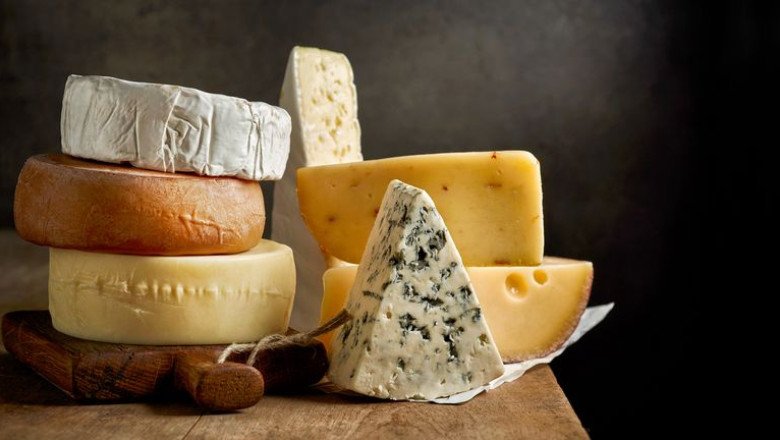
views
People arriving in Britain from the EU and other European countries are no longer allowed to bring in a range of meat and dairy products – including cheese.
It is part of a move by the UK government to try and stop the spread of foot-and-mouth disease from abroad.
The new rules, introduced on Saturday 12 April, mean travellers face restrictions on meat from pigs, cows, sheep and goats, as well as dairy items such as milk, butter, cheese and yoghurt.
They also include items like sandwiches filled with meat or dairy products, along with cured meats and raw meats – regardless of whether they are packed or packaged or whether they have been bought at duty-free.
The restrictions apply only to travellers arriving in Britain, and will not be imposed on personal imports from Northern Ireland, Jersey, Guernsey, or the Isle of Man.
There are currently no reported cases of foot-and-mouth disease (FMD) in the UK, with the last outbreak in 2007, but there have been confirmed cases this year in Germany in January, and in Hungary and Slovakia last month.
The UK government had already banned “personal imports of cattle, sheep and other ruminants and pig meat as well as dairy products” from those three countries “in response to confirmed outbreaks of FMD”.
The list of banned items has now been extended to such products from the whole of the EU as well as Switzerland, Norway, Iceland, Liechtenstein, the Faroe Islands and Greenland.
Here’s everything you need to know about the restrictions.
The government says you can’t bring the following products back from the countries listed above:
• Pork
• Beef
• Lamb
• Mutton
• Goat
• Venison
• Other products made from these meats, such as sausages
• Milk and dairy products like butter, cheese and yoghurt
The government has said you can bring in up to 2kg per person of powdered infant milk, infant food, or special food needed for medical reasons, but only if it does not need to be refrigerated before use, and is in branded, unopened packaging – unless it is in current use.
There are also pet food restrictions:
The government says you cannot bring in pig, cow, sheep, goat and deer products that are not for human consumption, like products made with pig meat.
You can bring in up to 2kg per person of special pet food needed for medical reasons, as long as it does not need to be refrigerated before use, and is in branded, unopened packaging.
If you are bringing in any other permitted animal products, such as pet food made with chicken meat, they must be either commercially packaged with the manufacturer’s name and address or have an animal by-product commercial document.
What can people continue to bring in?
• Fish
• Poultry, such as chicken, duck, goose and any other products made from these meats
• Other animal products like eggs and honey
And from the EU, Switzerland or Liechtenstein people can bring in the following as well:
• Fruit
• Vegetables
• Nuts and seeds
What happens if you break the rules?
Banned food products will be taken away and destroyed if you declare them to Border Force officers at customs.
The government warns that you could be prosecuted if you do not declare banned food products.
Border Force can take away your products if they think you’ve brought something into the country illegally or brought in too much of a restricted product.
They can also throw away any items, including clothing or bags, which they believe has been contaminated by the product – for example with blood from meat.
What is foot-and-mouth disease and what has been happening in other countries?
The latest restrictions are to “protect the health of British livestock, the security of farmers, and the UK’s food security”, said the Department for Environment, Food and Rural Affairs.
Foot-and-mouth is a viral disease which causes fever and mouth blisters in cloven-hoofed ruminants such as cattle, swine, sheep and goats.
It poses no risk to humans, but outbreaks often lead to trade restrictions such as the ones in place now.
In 2001, the disease led to the culling of millions of animals in the UK and the loss of billions of pounds, prompting a crisis in British farming.
There were 2,000 cases, but each case meant a farm having to kill and burn all its livestock, with more than six million sheep, cattle and pigs slaughtered.
The first outbreak in Germany for 36 years occurred in January, leading to the precautionary slaughter of 55 goats, sheep and cattle on a farm in Brandenburg.
Reports of foot-and-mouth emerged in Hungary in mid-March, with more than 3,500 cattle slaughtered in the country’s northern county of Gyor-Moson-Sopron.
After the outbreak in Hungary, cases were then reported across five farms in southern Slovakia, prompting the country to declare an emergency.
On 2 April, Hungary deployed soldiers and launched new disinfection measures in the northwest close to border regions to contain the outbreak.
Austria then closed 21 crossings into Hungary and two into Slovakia a day later.
https://wol.com/the-products-you-arent-allowed-to-bring-into-britain-from-the-eu-under-new-rules-uk-news/
























Comments
0 comment